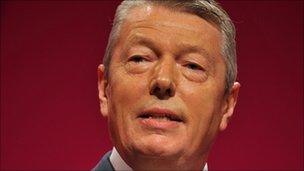Alan Johnson quits: Assessing the political impact
- Published

Alan Johnson has faced crticism of his performance as shadow chancellor
After only three months in the post, the news that Alan Johnson was standing down came as a complete surprise at Westminster.
In a statement Mr Johnson said he had taken the decision for "personal reasons" connected to his family.
"I have found it difficult," he said "to cope with these personal issues in my private life whilst carrying out an important front bench role".
No details have yet been released about the nature of these personal circumstances.
It is understood however that he informed Mr Miliband of his decision on Monday morning and although the Labour leader pressed him to stay, Mr Johnson would not be swayed.
In his resignation letter Mr Johnson praised Mr Miliband's leadership of the Labour Party and said he was confident he would lead the party from strength to strength.
A short time later it was announced Mr Johnson would be replaced by Ed Balls.
Upheaval
The Labour leader paid this tribute to Mr Johnson: "As shadow chancellor and a politician who held five cabinet positions, Alan showed real leadership on issues that mattered to families across our country, warning of the dangers posed by the government's gamble on growth and jobs, promoting educational opportunity and delivering neighbourhood policing."
He added, about his replacement: "Ed Balls is an outstanding economist and is hugely qualified to take our economic message to the country."
Inevitably, there will be speculation as to whether, alongside the undisclosed personal reasons, political factors may also have contributed to Mr Johnson's decision to quit.
Although hugely experienced, Mr Johnson rarely looked comfortable in his brief as shadow chancellor.
There was his light-hearted remark on taking up the post that he would need an economics primer; and then there was his uncertainty when pressed on television over the rate of National Insurance.
A supporter of David Miliband during the Labour leadership contest, Mr Johnson has also previously found himself at odds with his leader over a graduate tax and maintaining the 50p top rate of income tax.
Attention will now shift to his successor Ed Balls.
A key ally of Gordon Brown, Mr Balls has huge experience of economic affairs having spent many years at the Treasury as an adviser to Mr Brown.
However his much more robust opposition to cuts will prompt questions as to how far he may tilt Labour's economic strategy leftwards and away from the cautious approach of Mr Johnson.
Elsewhere, Mr Balls' wife, Yvette Cooper becomes the new shadow home secretary and Douglas Alexander takes over the foreign affairs brief.
It is a fundamental shake-up of Ed Miliband's top team - and hardly the sort of upheaval Mr Miliband would have wanted so early on in his leadership.
- Published20 January 2011
- Published20 January 2011